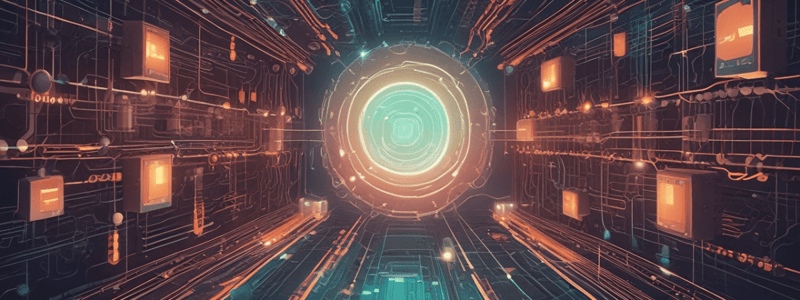Podcast
Questions and Answers
What is a key benefit of edge computing in business computing?
What is a key benefit of edge computing in business computing?
- Enhanced cybersecurity
- Increased reliance on cloud infrastructure
- Improved data storage capacity
- Reduced latency and bandwidth use (correct)
Which of the following is an emerging trend in business technology?
Which of the following is an emerging trend in business technology?
- The rise of 2G networks
- The rise of 5G networks (correct)
- The decline of 5G networks
- The end of IoT applications
What is a potential application of blockchain technology beyond cryptocurrency?
What is a potential application of blockchain technology beyond cryptocurrency?
- Supply chain management (correct)
- Cybersecurity threats
- Data storage solutions
- Cloud computing infrastructure
What is a key driver for the adoption of sustainable computing practices?
What is a key driver for the adoption of sustainable computing practices?
What is a potential impact of quantum computing on business computing?
What is a potential impact of quantum computing on business computing?
What is an emerging trend in cybersecurity?
What is an emerging trend in cybersecurity?
What is an application of 5G networks in business technology?
What is an application of 5G networks in business technology?
What is a characteristic of blockchain technology?
What is a characteristic of blockchain technology?
What is a key benefit of using open-source software and off-the-shelf hardware?
What is a key benefit of using open-source software and off-the-shelf hardware?
Which type of storage device is known for its large storage capacity and cost-effectiveness?
Which type of storage device is known for its large storage capacity and cost-effectiveness?
What is the primary advantage of Solid-State Drives (SSDs) over Hard Disk Drives (HDDs)?
What is the primary advantage of Solid-State Drives (SSDs) over Hard Disk Drives (HDDs)?
Which type of storage solution is ideal for businesses with remote or distributed teams?
Which type of storage solution is ideal for businesses with remote or distributed teams?
What is distributed processing in the business context?
What is distributed processing in the business context?
What is the main benefit of distributed systems in terms of scalability?
What is the main benefit of distributed systems in terms of scalability?
What is the primary purpose of a Network-Attached Storage (NAS) device?
What is the primary purpose of a Network-Attached Storage (NAS) device?
What is a key component of distributed processing?
What is a key component of distributed processing?
What is the primary benefit of using a Storage Area Network (SAN)?
What is the primary benefit of using a Storage Area Network (SAN)?
What is the benefit of resource sharing in distributed systems?
What is the benefit of resource sharing in distributed systems?
What is the primary limitation of Direct-Attached Storage (DAS) devices?
What is the primary limitation of Direct-Attached Storage (DAS) devices?
What is the primary advantage of distributed systems in terms of reliability?
What is the primary advantage of distributed systems in terms of reliability?
Which of the following is a key consideration for businesses when choosing a backing storage solution?
Which of the following is a key consideration for businesses when choosing a backing storage solution?
What is a type of distributed system where each node can serve both roles?
What is a type of distributed system where each node can serve both roles?
What is the benefit of distributed systems in terms of performance?
What is the benefit of distributed systems in terms of performance?
What is the key benefit of flexibility in distributed systems?
What is the key benefit of flexibility in distributed systems?
Flashcards are hidden until you start studying
Study Notes
Quantum Computing
- Has the potential to revolutionize business computing due to its ability to process massive datasets at unprecedented speeds.
- Can lead to breakthroughs in pharmaceuticals, logistics, and finance, where complex simulations and calculations are essential.
Blockchain
- Expected to expand beyond cryptocurrencies.
- Can be used by businesses for secure and transparent supply chain management, smart contracts, and mitigating cybersecurity risks.
- Attributes of decentralization and immutability make it suitable for these applications.
Edge Computing
- Becoming crucial in business computing due to the increasing number of devices connected in the Internet of Things (IoT).
- Involves processing data closer to where it is generated, reducing latency and bandwidth use, and enhancing real-time data processing capabilities.
Sustainable and Green Computing
- Businesses are expected to adopt sustainable computing practices due to growing concerns over climate change.
- Includes optimizing data centers for energy efficiency, using renewable energy sources, and developing eco-friendly hardware.
Emerging Trends in Business Technology
5G Networks
- Will significantly impact business technology with higher speeds and lower latency.
- Enables more efficient remote working, improves IoT applications, and opens new avenues for mobile commerce and real-time data analysis.
Cybersecurity
- Importance is magnified due to increased digitalization.
- Emerging trends include the use of AI for threat detection, adoption of zero-trust security models, and increased focus on data privacy regulations compliance.
Distributed Processing
- Refers to the use of multiple computers working together to perform tasks.
- Enables more efficient data processing and resource utilization.
Basics of Distributed Processing
- Involves a network of interconnected computers that communicate and cooperate to achieve a common goal.
- Components include multiple computer systems, a network connecting them, and software enabling communication and task distribution.
- Tasks are divided into smaller parts, distributed among the computers, and results are communicated back to a central system or coordinator.
Types of Distributed Processing
- Client-server systems, where clients request services from centralized servers.
- Peer-to-peer systems, where each node can serve both roles.
Advantages of Distributed Systems
- Scalability: easily scalable by adding more nodes.
- Reliability: failure of one node does not cripple the entire system.
- Resource Sharing: resources such as databases and processing power can be shared across different nodes.
- Flexibility: offers flexibility in terms of location, hardware, and software choices.
- Performance: can process large volumes of data more quickly than a single computer.
- Cost-Effectiveness: can be more cost-effective, allowing for the use of cheaper, off-the-shelf hardware and open-source software.
Backing Storage Solutions
- Refers to methods and devices used to store data in a non-volatile manner.
- Crucial for data integrity, security, and accessibility in business.
Types of Storage Devices
- Hard Disk Drives (HDDs): traditional storage devices that use magnetic storage, known for large storage capacity and cost-effectiveness.
- Solid-State Drives (SSDs): faster than HDDs, use flash memory to store data, and have no moving parts.
- Network-Attached Storage (NAS): dedicated file storage device that provides multiple users and client devices access to data through a network.
- Cloud Storage: involves storing data on remote servers accessed from the internet, offering flexibility, scalability, and remote access.
Types of Storage Devices Used in Businesses
- Direct-Attached Storage (DAS): physical storage devices directly attached to a computer or server, offering fast data access but limited sharing capabilities.
- Storage Area Network (SAN): high-speed network that provides block-level network access to storage.
Studying That Suits You
Use AI to generate personalized quizzes and flashcards to suit your learning preferences.




